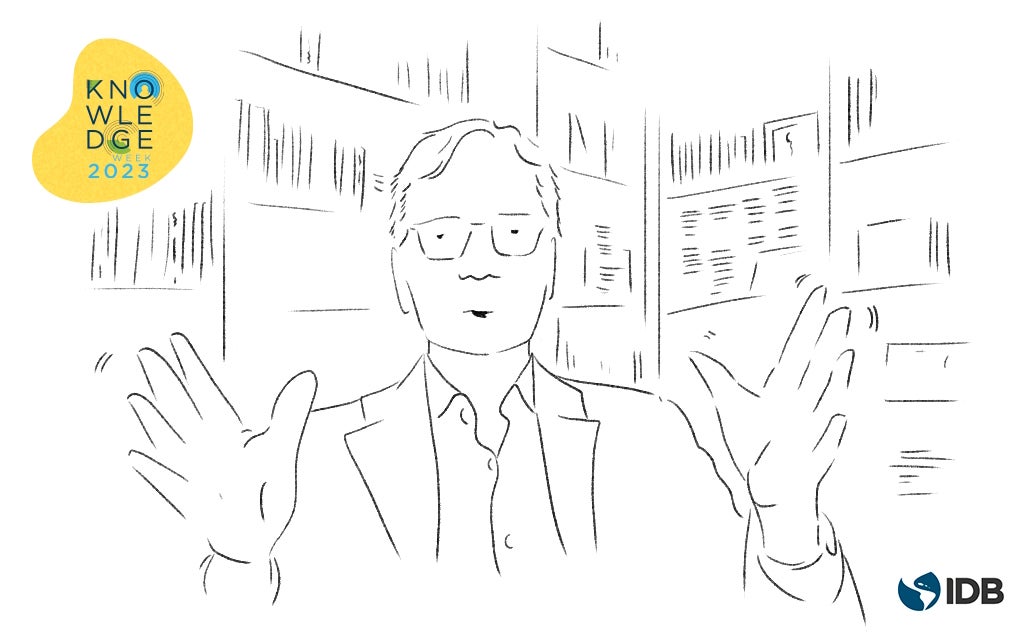Philanthropist, innovator, and social investment pioneer. It is hard to imagine anybody more qualified to talk about how financial markets can enlist capital to achieve development goals than Sir Ronald Cohen, a driving force behind the invention of the social impact bond and the current president of the UK-based Global Steering Group for Impact Investment. Sir Ronald’s experiences stand as a testament to the way in which markets and entrepreneurship can advance global social and environmental goals.
On October 23rd, Sir Ronald Cohen joined us for our roundtable on “How to Promote Development Effectiveness” as part of our 2023 Knowledge Week. He commented on the growth of pay-for-success financial instruments, which have evolved from the issuance of the first social impact bond in 2010, aimed at reducing criminal recidivism in the U.K., to a $1.25 trillion sector of sustainability-linked bonds and loans. These instruments are centered on the concept that investors should be rewarded based on the achievement of predefined environmental or social targets. The move change away “from just optimizing risk-return to optimizing risk-return and impact is a very significant, change,” he said, adding that outcome partnerships – typically involving investors, government, and service providers – deliver services for half the price of the traditional service fee.
Sir Ronald cited the Education Outcomes Fund, which he chairs, and which currently has programs in Ghana and Sierra Leone with about $50 million in outcome payments to improve learning for 300,000 children. The ambition is to still greater: to raise a billion dollars of commitments and capital from national governments in Africa and the Middle East, as well as philanthropies and other donors, to improve children’s lives. Running through it is a critical structure. The outcomes are achieved through contracts the governments and donors sign with delivery organizations, which in turn receive the investment capital they need to achieve their goals from impact funds.
Such contracts not only fund much-needed programs, but they also generate huge substantial amounts of data. As delivery organizations seek to hit their targets, much is learned about what works and what doesn’t in achieving development goals, and those lessons then inform the decision-making process for public policies. Evidence is shared, and impacts are evaluated. But, according to Sir Ronald, these are components of the process. Its engine is results-based financing, which brings together the private sector, the public sector, academics, and social organizations, all with their own incentives.
“Government is incentivized because it does it at half the traditional fee for service. Investors are motivated and incentivized because they get both a financial and social return. The organizations using the investment capital in these outcome partnerships have contracts that give them the business model, enabling them to achieve revenues if they hit their targets in education or any other field,” he said. Crucial sectors are thus motivated to achieve their goals and get remunerated, with outcome-dependent payments enforcing discipline on the organizations delivering the services. And the power of evidence and evaluations in this scheme is critical. When you have results-based funding, it is based on evidence. And it is based on [project] evaluation, he said.
A crucial challenge is encouraging a shift in government mindset. Governments often do not primarily engage in outcome-based commissioning, but rather tend to favor competitive fee-for-service arrangements. But this may be an outmoded way of thinking when considering all the changes in the financial markets that have made it easier to attract resources. Indeed, given the vast amounts of capital available and investors interested in achieving impact and a financial return, governments have every motivation to overcome inertia and develop the institutional readiness to change their way of commissioning projects. The result will be greater efficiency and effectiveness as outcome funds prepare specific tariffs for education, health, or whatever social policy targets. “We can provide incentives for the organizations delivering the service to do so in the most effective way socially,” he said. Such programs will be cheaper and better in quality, with superior evidence and everything evaluated and audited to the highest standard, he added.
Development banks, such as the IDB, have a critical role to play in this new world, where the $1.25 trillion in sustainability-linked bonds and loans dwarfs the $150 billion a year spent by development organizations, Sir Roland said. They can use their skills to help put together outcome funds, finance the organizations that will eventually be paid by investors for reaching targets, and advise governments on how to structure themselves to take full advantage of the new modalities. That includes helping to figure out a budgetary cycle that enables governments to commit to payments five to ten years down the line, rather than through an annual budget, with initiatives that lock in the program so that if there’s a change in government, the program continues.
Results-based funding is capable of attracting a lot more funding than we have today in the development sector. This change in financing requires new skills that an organization like the IDB, working with outcome funding, can supply. Whether the goal is improving education, health, or some other development goal, there is a new dynamic that allows for a market that hosts the incentives to tackle essential challenges more efficiently, at scale, with more significant innovation and better outcomes.


Leave a Reply